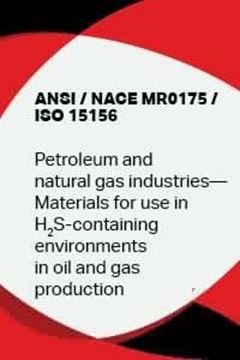HISTORICAL DOCUMENT. Material requirements for resistance to sulfide stress cracking (SSC) in sour refinery process environments (i.e., environments that contain wet hydrogen sulfide [H2S]). AKA "wet H2S cracking".
CORRECTION OF PUBLICATION:
In January 2016, NACE published an incorrect version of ANSI/NACE MR0103/ISO 17945:2015 (Petroleum, petrochemical and natural gas industries — Metallic materials resistant to sulfide stress cracking in corrosive petroleum refining environments). That document was incorrectly titled ANSI/NACE MR0103/ISO 17495:2016. The erroneous standard was retracted at the time and the NACE Store has the corrected version. NOTE: The contents of both versions of the standard are identical. The only discrepancies are in the title.
Product Number:
21305-SG
Publication Date:
2015
$180.00
$180.00
$180.00
HISTORICAL DOCUMENT. Defines material requirements for resistance to sulfide stress cracking (SSC) in sour refinery process environments (i.e., environments that contain wet hydrogen sulfide [H2S]). The term "wet H2S cracking" as used in the refining industry covers a range of damage mechanisms that can occur due to the effects of hydrogen charging in wet H2S refinery or gas plant process environments. One of the types of material damage that can occur as a result of hydrogen charging is sulfide stress cracking (SSC) of hard weldments and microstructures, which is addressed by this standard. This standard is intended to be utilized by refineries, equipment manufacturers, engineering contractors, and construction contractors.
CORRECTION OF PUBLICATION:
In January 2016, NACE published an incorrect version of ANSI/NACE MR0103/ISO 17945:2015 (Petroleum, petrochemical and natural gas industries — Metallic materials resistant to sulfide stress cracking in corrosive petroleum refining environments). That document was incorrectly titled ANSI/NACE MR0103/ISO 17495:2016. The erroneous standard was retracted at the time and the NACE Store has the corrected version. NOTE: The contents of both versions of the standard are identical. The only discrepancies are in the title.
Key words: aluminum alloys, austentic stainless steels, carbon steels, cast iron, ceramic coatings, cobalt alloys, copper alloys, ferritic stainless steels, free-machining steels, hydrogen sulfide, low-alloy steels, martensitic stainless steels, metals, nickel alloys, oilfield production equipment, precipitation-hardening steels, sour environments, stainless steels, sulfide stress cracking.




